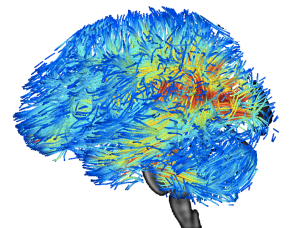
This October, members of the Duke Neurology Department contributed to 12 new peer-reviewed journal articles, advancing our understanding of Alzheimer’s disease, stroke, chronic pain, and other conditions. These articles include discussions of the best framework for neuroscience curricula for medical students, the discovery of an existing experimental drug which offers a new avenue for treating pain without potential addiction issues, and an examination of the viability of ketogenic diets as an alternative treatment for amyotrophic lateral sclerosis (ALS). Read the paragraphs below for short summaries of each of these studies, as well as links to the original articles themselves.
General and Community Neurology
- A core understanding of neuroscience principles is a basic requirement of a medical school education, but it is a constant challenge to decide what elements are needed as our knowledge, the medical curriculum and health care evolve at a rapid pace. Christian Hernandez, MD, was part of a team that wrote a new organizational framework for teaching the essential neuroscience background needed by all physicians. Read their article in the latest issue of Neurology.
Vascular Neurology and Stroke
- Strokes can have lasting, long-term effects on cognition and an individual’s ability to function, but the types and extent of sequelae following right hemisphere stroke have been understudied. Nada El-Husseini, MD, and Brian Mac Grory, MB BCh, MRCP, contributed to a review article discussing the psychiatric sequelae of stroke in the right hemisphere of the brain. Read their discussion in the Journal of the Neurological Sciences.
- Dual antiplatelet therapy has been shown to reduce the risk of recurrent stroke in patients with minor stroke or transient ischemic attack, but whether pretreatment antiplatelet status modifies this effect is unclear. To answer this question Brian Mac Grory, MB BCh, MRCP, and colleagues performed a post hoc analysis of the recent POINT trial, finding that in patients with minor stroke and high-risk transient ischemic attack, dual antiplatelet therapy reduces the risk of ischemic stroke regardless of premorbid antiplatelet use. Read that article in Stroke.
- Patent foramen ovale (PFO), a common condition where a person has a small opening between the two upper chambers of the heart, may increase the risk for ischemic stroke, but this condition remains understudied. Brian Mac Grory MB BCh, MRCP, was part of a team that reviewed current management of patients with ischemic stroke among individuals with PFO and discussed some areas of controversy. Read what they wrote in Current Cardiology Reports.
Translational Brain Sciences
- Online repetitive transcranial magnetic stimulation (rTMS) has been shown to modulate working memory performance in a site-specific manner, but no studies have yet demonstrated distinct modulatory control of these two subprocesses. In a new article in Brain and Behavior, Simon Davis, PhD, and colleagues sought to explore this possibility through site-specific stimulation during an online task invoking both skills. Read what they found here.
- A new study in the Journal of Alzheimer’s Disease answers important questions about the progression from mild cognitive impairment (MCI) to Alzheimer’s disease. A team including Michael Lutz, PhD, evaluated the associations between polygenic risk scores for Alzheimer’s as well as time to Alzheiemer’s progression from MCI, changes in longitudinal cognitive impairment, and biomarkers from cerebrospinal fluid and imaging. The team found that polygenic risk scores can be useful for the prediction of time to Alzheimer’s and other clinical changes after the diagnosis of MCI. Read their full article here.
- The genome of the amoeba Dictyostelium discoideum encodes for a large class of small proteins that are developmentally regulated. The Duke Center for Neurodegeneration and Neurotherapeutics’ K. Matthew Scaglione, PhD, led a team that deleted six of the genes that encode these proteins to determine if they play an essential role in its development, finding that their deletion had no effect on the process. Read more about their findings in MicroPublication Biology.
- While sex dimorphism is increasingly recognized as an important factor in pain, female-specific pain signaling is not well studied. A team including Yong Chen, PhD, found that the pro-inflammatory cytokine Interleukin-23 (IL-23) produced mechanical pain in female but not male mice, and chemotherapy-induced mechanical pain is selectively impaired in female mice lacking Il23 or Il23r. Their study in Neuron also found sex dimorphism at both immune and neuronal levels. Read it here.
- Katherine Peters, MD, PhD, was the senior author of a new case report discussing a female patient with astrocytoma who developed avascular necrosis, a rare but serious adverse event associated with the use of corticosteroids. Read that report in CNS oncology.
Neuromuscular Disease
- The latest issue of Neurotherapeutics features large retrospective study of the beneficial effects of thymectomy on the progression of ocular myasthenia gravis to generalized MG. Don Sanders, MD, was the senior author of an accompanying discussion that discusses which patients to prioritize for this form of therapy. Read that article here.
- Rick Bedlack, MD, PhD, was the first author of the 63rd entry in the ALSUntangled series which reviews alternative and off label treatments with a goal of helping patients with ALS make more informed decisions about them. Their latest discussion examines ketogenic diets for their potential mechanisms of action and existing evidence for helping patients with ALS. Read that discussion in Amyotrophic Lateral Sclerosis and Frontotemporal Degeneration.
Headache and Pain
- Yong Chen, PhD, was the first author of a study that found that an experimental cancer drug called kenpaullone enhances the expression of the gene KCC2, which is essential for silencing pain signals. The drug was effective in treating mouse models of pain from nerve injury and bone cancer, offering a new avenue for treating pain without potential addiction issues. Senior author Wolfgang Liedtke, MD, PhD, and Peng Wang, MS, also contributed to the study, which appears in Nature Communications.